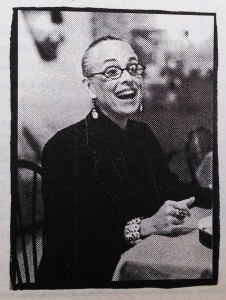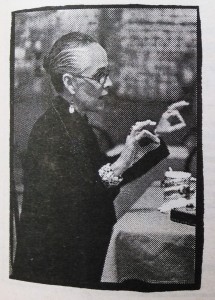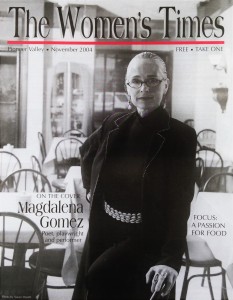The following post is by undergraduate and UConn History Department intern Diana Alvarado about her current project working with materials in the Archives & Special Collections.
My name is Diana Alvarado, and I am a first-year student at the University of Connecticut. Lots of people seem to think that being a history major is just about learning the facts of the past, but it really is so much more than that. It’s also about making a connections with stories and getting into the minds of the people in those stories.
At the Archives & Special Collections in the Thomas J. Dodd Research Center, I have been doing research about second wave feminism, and I found an article in “The Women’s Times” about Magdalena Gomez, a Puerto-Rican poet, playwright, and feminist. While reading the article by Allison Tracy, I was able to get a good look at her life as a minority and a woman. I can understand that also being a Puerto-Rican and female would make it easier for me to relate to Gomez than someone who wasn’t, but her story gives us a look inside the mind the of the feminists who weren’t the center of attention in the movement. Why is this important? It’s important because we can learn so much more about how the movement continues to impact our lives today; we can understand who we are a little more, and we can be more inspired to continue the work that feminists devoted their lives to.
In the article, “Lobster Face: A Poet, Playwright and Performer Claims Her Identity” Gomez expresses the point of her autobiographical play of the same name (Lobster Face). The title is supposed to represent “the blush that shame suffuses” and later what Gomez explains it as “the red mark of failure… like a teacher’s red X across a poem for not meeting some standard set forth by the dead white male literary police” (Tracy). Gomez took all the oppression and criticisms of being Puerto-Rican and being female into an art form, an art form that anyone can see and understand, no matter who they are. Gomez’s play—in addition to her poetry—show what it’s like to be in the mind of the marginalized.
 Gomez did not have an easy childhood. She explained that her mother was abusive both physically and emotionally towards her. She explains that her mother had a battered past due to being sold for sex at a very young age (Tracy). However, Gomez was able to see to her mother’s capacities for empathy: “I was able to see her gifts”, Gomez told, “beauty and power, as well as the monster that tried to destroy me. They lived in the same woman” (Tracy). What Gomez is doing by describing her mother this way is showing that women are complex. This statement would not be widely accepted in our patriarchal society. Women are often portrayed in media and expected to be simple, easy, and not dynamic in any way. Through her personal history, Gomez is able to connect to broader issues that anyone can connect to.
Gomez did not have an easy childhood. She explained that her mother was abusive both physically and emotionally towards her. She explains that her mother had a battered past due to being sold for sex at a very young age (Tracy). However, Gomez was able to see to her mother’s capacities for empathy: “I was able to see her gifts”, Gomez told, “beauty and power, as well as the monster that tried to destroy me. They lived in the same woman” (Tracy). What Gomez is doing by describing her mother this way is showing that women are complex. This statement would not be widely accepted in our patriarchal society. Women are often portrayed in media and expected to be simple, easy, and not dynamic in any way. Through her personal history, Gomez is able to connect to broader issues that anyone can connect to.
 Gomez further taps into her past experiences of oppression that inspire her work by recalling her frustrations with trying to get a college education: “as an artist, I simply wasn’t engaged by the conformist curriculum; none of the white male teachers could understand me, or me, them” (Tracy). This wall did not stop Gomez, she stayed true to herself—no matter how hard it got.
Gomez further taps into her past experiences of oppression that inspire her work by recalling her frustrations with trying to get a college education: “as an artist, I simply wasn’t engaged by the conformist curriculum; none of the white male teachers could understand me, or me, them” (Tracy). This wall did not stop Gomez, she stayed true to herself—no matter how hard it got.
The importance of identity to Gomez brought her to success. Her play “Lobster Face” has been featured on Broadway and has won awards for her productions (Tracy). Magdalena Gomez is not just a poet, a playwright, a Puerto-Rican, or a woman. She is an example of fighting for the right to dignity and identity. I wouldn’t think what my life would be like if I didn’t have people like Gomez to show me that finding out who we are is one of the most important things to do in life. I am indebted to women like Gomez who have come before me. To be on the cover of a women’s newsletter, in such a way that shows power, poise, and prominence shows how important it is for people to be inspired to continue the work and devotion to the feminist movement.
Source: Magdalena Gomez Papers, Box no. 8; The Women’s Times

